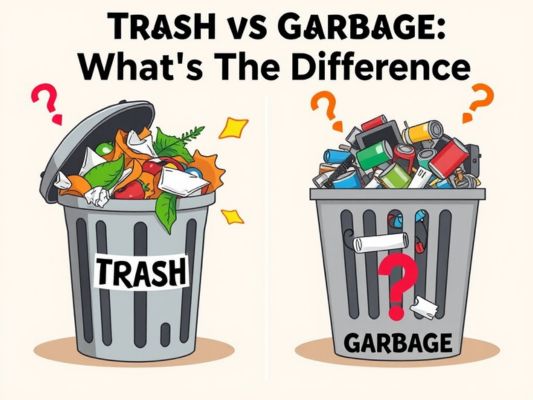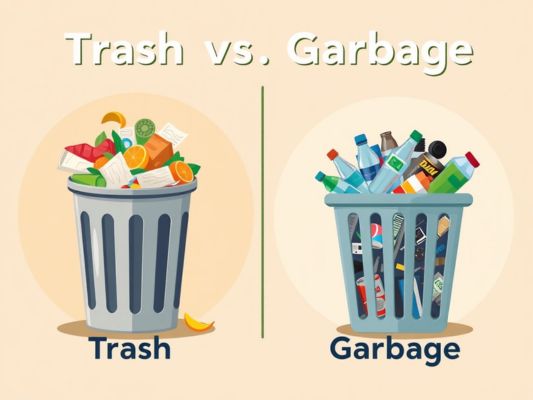Understanding the difference between trash vs garbage is more than just a language lesson. These words are often used interchangeably in everyday conversation, but they refer to distinct types of waste. In the U.S., knowing the nuances between these terms can help improve waste management and encourage more sustainable waste practices. Let’s explore how these two words differ and why it matters for the environment.
This article dives deep into the origins of the terms, their environmental impact, and how we handle them differently. By the end, you’ll not only understand the trash vs garbage differences but also how to adopt better waste reduction strategies.
What is “Trash”?
Trash refers to non-biodegradable waste, which includes materials that do not break down naturally over time. These are items like plastic waste, old electronics, and furniture. Trash is commonly made of non-recyclable materials, although some forms, like metal recycling or glass recycling, are possible with the right systems.
In the U.S., trash disposal usually involves landfills or recycling programs. However, much of it ends up clogging landfills, contributing to pollution. Managing landfill overflow is a growing challenge as the volume of non-biodegradable items increases. By sorting and separating recyclable materials, we can reduce the burden on landfills and help protect the environment.
What is “Garbage”?
Garbage is organic waste, meaning it consists of materials that decompose naturally. Examples include food scraps, yard waste, and other compostable food waste like coffee grounds and eggshells. These items can be turned into compost, which enriches the soil and supports sustainable waste practices.
Unlike trash, garbage disposal methods focus on composting garbage rather than simply discarding it. Proper food waste management not only reduces waste but also lowers methane emissions in landfills. With a shift toward composting, individuals and communities can contribute to waste reduction and improve soil health.
Trash vs Garbage: What’s The Difference

The differences between trash and garbage come down to the types of waste materials and how they are managed. Trash is made up of non-biodegradable waste, like plastics, metals, and paper products, while garbage includes organic waste that can decompose, such as food and yard clippings.
Trash is non-biodegradable, often including plastic, glass, or metal. Garbage, on the other hand, is biodegradable and includes food scraps and yard waste. While trash is commonly handled through landfills or recycling, garbage is usually composted to enrich the soil.
Trash’s impact on the environment is long-term pollution, whereas garbage, when improperly disposed of, can release harmful methane gases. However, composting garbage can turn it into a valuable resource.
Origins of the Words “Trash” and “Garbage”
The word trash comes from Old Norse, where it originally referred to broken or discarded objects. Over time, it evolved to describe items of little value or things meant to be thrown away. Today, the term primarily refers to non-recyclable waste like plastic waste or old furniture.
Garbage has its roots in Anglo-French, where it originally referred to kitchen waste, such as animal entrails. The meaning expanded to include all organic waste, such as food scraps and yard waste. This historical background reflects its association with biodegradable and compostable food waste.
Environmental Impact
The environmental impact of trash and garbage depends on how we handle them. Trash contributes to pollution, especially when non-biodegradable items like plastics end up in landfills or oceans. Recycling helps but isn’t always available for all materials, such as some plastics.
Garbage, on the other hand, can have a positive or negative impact. When composted, it becomes a resource that enriches soil and promotes sustainable waste practices.
However, when dumped into landfills, garbage releases methane, a greenhouse gas that worsens climate change. By focusing on composting garbage and waste decomposition, we can turn garbage into a valuable asset for the environment.
FAQs
Is garbage American or British?
“Garbage” is primarily an American term, while the British equivalent is often “rubbish.”
Are garbage and trash synonyms?
Yes, they are synonyms, but “garbage” often refers to organic waste, while “trash” is more general and includes non-organic materials.
What is the difference between trash and dustbin?
“Trash” refers to waste itself, while a “dustbin” is the container used to hold that waste, commonly used in British English.
How do you say garbage politely?
You can say “waste” or “refuse” to politely refer to garbage.
What is the historical origin of the word trash, and how has its meaning evolved?
The word “trash” originates from Old Norse and referred to broken or discarded materials, later expanding to all non-organic waste.
Conclusion
The terms trash vs garbage may seem interchangeable, but they represent two distinct categories of waste. Trash is non-biodegradable waste, while garbage is organic waste that decomposes naturally. Understanding these differences is essential for improving waste management, reducing pollution, and adopting sustainable waste practices.
By separating waste properly, focusing on plastic recycling, and embracing composting, we can minimize the environmental impact of our daily lives. Let’s take small steps toward better household waste disposal and inspire others to do the same. Every effort counts in creating a cleaner, healthier planet.
With 5 years of experience in grammar, I, Admin, deliver accurate, clear, and reliable content. My expertise ensures top-quality insights in this niche.

